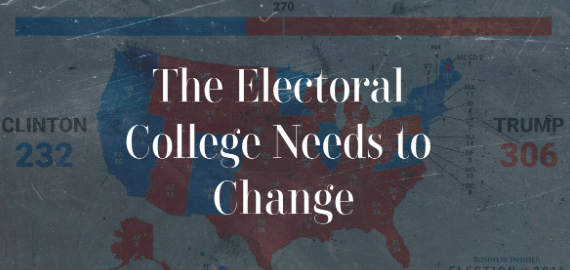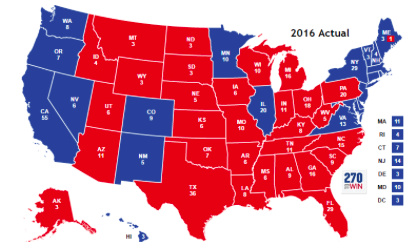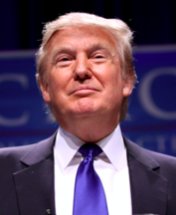The Electoral College Needs To Change

A system that has been deeply flawed for as long as we’ve used it, the electoral college needs modifications in order to fairly represent the people
October 30, 2020
The election is in two weeks and tensions couldn’t be higher. The nation is determined to prevent another situation as detrimental as the voter turnout in 2016, when around 43% of eligible voters didn’t cast a ballot.
But perhaps the next step in improving the voter turnout isn’t just trying to appeal to voters, but to change the system itself–the electoral college.
The electoral college has been causing problems for a while now, though it’s been a topic that politicians seem to be hesitant to address. Many voters from 2016 who did not vote cited that they didn’t vote because they didn’t think their vote would matter. And although this is false, there is unfortunately, a kernel of truth to this belief.
Now please don’t misunderstand what I wish to say. I could not be more frustrated to be seventeen during an election year, and you have to make your voice count. If you are eligible to vote, I implore you with the most fervent energy I can muster to go out and vote if you have not done so already — your vote does matter.
But the unfortunate fact remains that depending on where you live, your vote will not count nearly as much on a national scale as we would like to think it does.
A vote from someone like you or I in Lake Forest can be important to the state, but on a national scale, their vote means next to nothing compared to someone who lives in a swing state such as Wisconsin or Pennsylvania. Say what you will, but that doesn’t sound particularly fair to me.
In fact, there are five times in recorded history when a presidential candidate has lost the popular vote, yet still been elected to office — the most recent instance being the election of President Donald Trump in 2016. 
How can we parade around and act like we’re a symbol of the power of democracy when the system we use can silence the wishes of the people?
We don’t need to get rid of the electoral college, but it definitely needs to change. We have gradually updated and improved every function of our government over time since we first gained independence in 1776, but as far as I can see, the electoral college–one of the most important mechanics of our administration–has not been touched.
When it was established, the electoral college was designed to protect the United States from the tyranny of mob rule, specifically from the perspective of a minority, but now all it seems to do is unfairly tip the scales of someone’s vote. The power of the majority and the minority isn’t equal anymore; instead, it favors the latter. Because this system has remained untouched, the electoral college now gives a majority of voting power to rural areas despite the fact that 80% of the population in the United States lives in some kind of urban environment today.
Which begs the question, maybe the end goal shouldn’t be trying to convince people to show up and cast their ballots.
Perhaps the real problem that we need to fix isn’t the voters–it’s the system.







Hunter Biden • Nov 20, 2020 at 10:30 am
BECAUSE THE PARTY OF SCIENCE, EQUALITY, AND RIGHTEOUSNESS WON WE DO NOT NEED TO CHANGE THE ERECTORAL COLLEGE. WE NEED TO HOWEVER REFORM THAT WHEREIN THE CORRECT PARTY WINS EVERY ELECTION.
Fact_Lover • Nov 4, 2020 at 7:10 pm
This is embarrassingly incorrect. For one thing, you refer to America as a “democracy” when we are in fact a republic. Second of all, you are confusing correlation for causation. Just because because someone wins the popular vote, does not mean that more people voted for them. It just so happens out of pure coincidence that every time someone who won the popular vote lost the electoral college, the person with the most votes did not become president. Lastly, you are making the grave mistake of assuming that all votes should be counted equally. When did the founding fathers ever say they wanted Californian votes to count? That is right, never!
Truman Thuente • Oct 30, 2020 at 10:33 am
Respectfully, this is wrong. The electoral college does not give the majority of the vote to the rural population at all. In 2016 Hillary Clinton got all 20 of the elctoral votes in Illinois as well as 55.8% of the popular vote, despite only winning 7 out of the 102 Illinois counties. I don’t think anyone will argue against the fact that the vast majority of Illinois is rural, and that rural population voted very much red, but the urban populace was overwhelming and represented so in the direction of the electoral votes.
Biden 2020 • Oct 30, 2020 at 9:01 am
noooooooo drumpf won using the electrical college?! that means we MUST get rid of it, to prevent such a disaster from happening again!